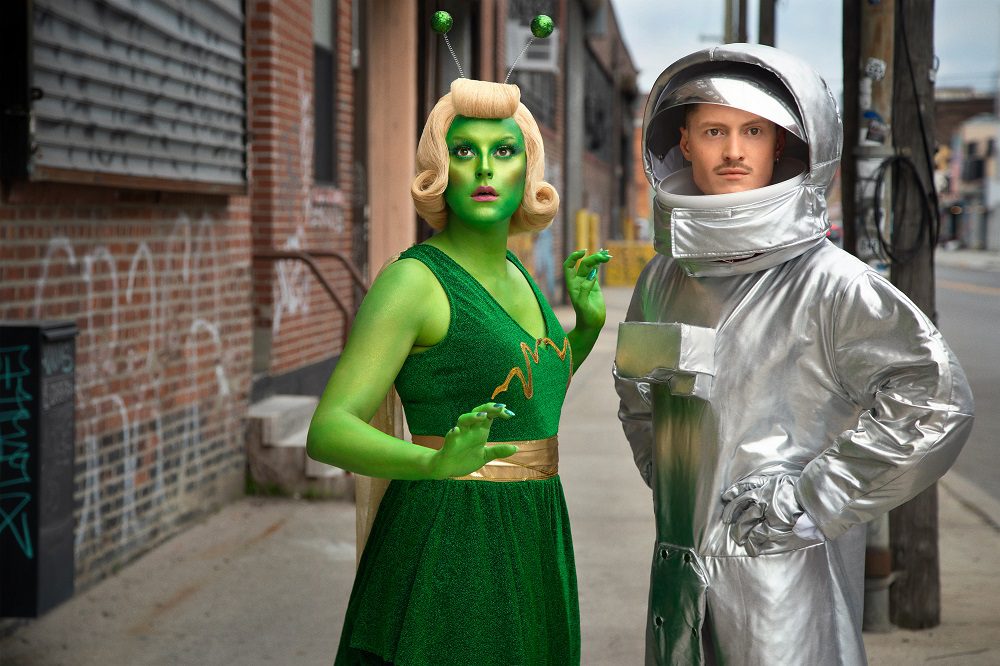REVIEW: BHuman Has Landed With Intergalactic Queer Concept LP BMovie

B movie sci-fi and horror flicks are special kinds of charmers. The Blob (1958), It Came from Outer Space (1953), Plan 9 from Outer Space (1959) and War of Planets (1966), among countless others, all possess a particular aesthetic: delightfully outlandish. Certainly in the 1950s and ‘60s, such bizarre fantasies and their bloated space creatures cloaked a very real, tangible paranoia that spread like wildfire. The world was in the throes of the Cold War, and the art of cinema was vital for the collective cathartic release.
Brooklyn alt-pop duo BHuman ─ comprised of Billie Lloyd and Harrison Scott ─ excavate a smorgasbord of cosmic energies and classic b movie imagery to plot a concept record that dissects identity, self-discovery and alienation as queer folk. The aptly-titled BMovie is structured “to be almost a fictional movie soundtrack that reveals itself through the song and tracklist,” says Scott. BMovie comes on the heels of a self-titled EP released earlier this year, signaling big things for the prolific duo. The LP is raw, honest and relevant – a treasure trove of electro-pop that is unafraid to be bold and drive the narrative forward. Billie Lloyd and Harrison Scott are the kind of innovative thinkers that could be total game changers for pop music.
The effervescence fizzes right from the start ─ “Strange Things (Overture)” pops the lid with a kooky soundbite: “I saw a flying saucer…” Though the songs focus on the innate human desire to love and be loved, quirky production choices inspired by cult films and television gives every song an eerie kitsch.
On “Melt,” BHuman’s synth-filtered forms dissipate into pitter-patters of percussion and other sticky distortions that feel so peculiar its easy yo get lost in their haze. The lyrics reflect that liquid, permeable feeling; “I know that you’re scared / I feel it, too / Maybe I’ll just melt right into you,” the duo vow on one of the album’s most immediate hooks. Their boldness in composition and vocal performance is always the appropriate amount of strange and never appears so left field as to ward off potential fans. In fact, it’s their aloofness that is most compelling.
“Other Way” (soon to have its own Carrie-inspired music video) emerges with a radio-ready earworm of a chorus that cribs The X-Files theme song. Distant samples come back like lost transmissions from outerspace (“You didn’t actually believe you were the only inhabited planet in the universe?”) as Lloyd coos, “I guess what they say is true that / Things find you when you’re looking the other way.” Here, the surreal subtext elevates the relatively common pop trope of finding love in an unexpected place.
Their blip-bent version of Cher’s “Believe” is also a marvel to witness. A marching band washes in sharp waves beneath their vocals, which almost seem detached and cold, as if cast in ice, yet they remain quite evocative. In the video, Scott assumes the role of Mulder to Lloyd’s Scully (again referencing The X-Files and giving an altogether different context to the word “Believe”), as well as an intergalactic odd couple.
“Distraction,” meanwhile, is slathered with hip-hop shimmer, and its less linear melody underscores the aching mood writhing across their bedroom carpet. “Fiction” draws from a similar musical wellspring, employing handclaps and clicks to heighten its intensity, and builds upon the emotional framework. “Baby boy has got this mad ambition / But it’s all lies and contradictions,” they weep. The web of lies into which they’ve fallen becomes nearly unconquerable, but in shedding the stark truth, they wiggle free and soar into a liberating glow. “Materializations (Intermission)” is a glittering reprieve and sets the more polished tone of the second half. “I May Never Know” bounces along neon-colored synths and teases that they’ve finally come to accept heartache (“If your love is gone, I can let it be”) and embrace who they were always meant to become.
Their story comes to a crescendo on the one-two punch of “Creator (Interlude)” – which makes reference to 1953’s Glen or Glenda, starring Ed Wood (also the director), a docudrama about crossing-dressing and transsexuality – and “Teachmehowtobeyourgirl,” perhaps the set’s most vulnerable moment. Lloyd sings candidly on the pressures she experiences as a trans woman in relationships, striking a timely core: “You don’t have to be ashamed / Your love for me is not so wrong / You just weren’t raised that way.” Juxtaposed with the Ed Wood snippets, it’s easy to see why Lloyd and Scott are so drawn to tales of alien invasion hysteria; modern society still has a long way to go to fully accept those in the LGBTQ community, but BHuman confront the world that still sees them as “freaks,” destroys any and all preconceptions, and move one step closer to finally feeling comfortable in their skin.




